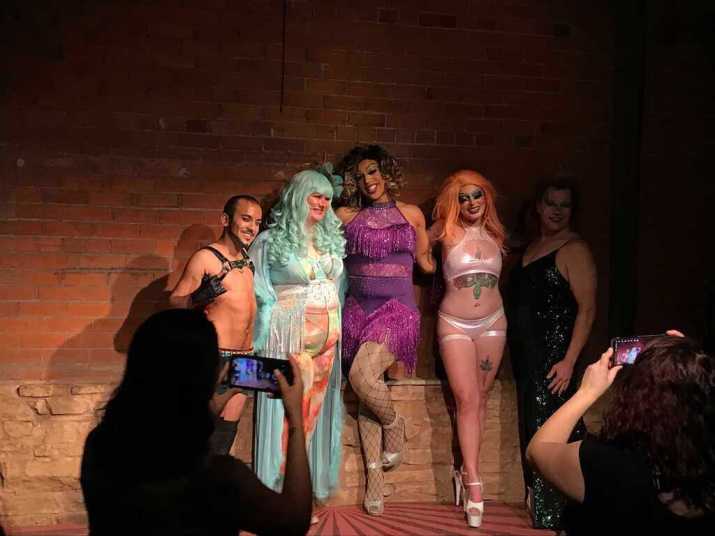
Over spring break, I attended an LGBTQIA+ dance party in my hometown of Boulder, Colorado. The event consisted of around 30 partygoers and a handful of drag performers dancing around in the bizarrely sweltering back room of what is by day an independent cafe/bookstore. My friend and I spent the night screaming ourselves hoarse and crushing on everyone we saw while being too shy to flirt with any of them — to sum up, it was a very queer night. And it felt tremendously freeing.
On the drive home, I tried to figure out why this event felt so different from previous queer events I’ve attended. It sounds cliché, but I felt I could be myself much more on this sweaty, makeshift dance floor than I ever have at any citywide pride parade. This party made it clear that authentic queer spaces that are free from corporate sponsorship and the restraints of mainstream respectability are necessary for the LGBTQIA+ community to thrive. And although it can seem like a sign of progress, queer culture going mainstream is not always a good thing.
One problem with many mainstream LGBTQIA+ events is that they are not truly centered around the queer community. As LGBTQIA+ rights have gained more mainstream acceptance in the past few decades, the idea of queer pride has become increasingly commodified and watered down into sponsored parades and events that are more palatable for the heterosexual mainstream. The consequence is that at large, city-approved Pride Month events, I can’t help but feel like the focus isn’t on actual queer people; instead, we serve as a fun theme that other people can use to make money. The LGBTQIA+ dance party was a breath of fresh air, with its absence of AT&T sponsored floats or vendors hawking polyester rainbow flags.
It is important to remember that no matter how many rainbows they splash on their websites during June, companies are not truly our allies and they don’t have the best interests of our community in mind. AT&T for example, boasted about its “moral and business obligation to engage on the fundamental issues of equality and fairness.” However, as the company posted pictures of rainbow flags last June, it also made at least 327 donations totaling $204,350 to 133 anti-LGBTQ legislators. And AT&T is not an anomaly. CVS, Walmart, Comcast, NBCUniversal and Wells Fargo are just a few of the companies that claim to support LGBTQIA+ rights when it makes them look good, while donating millions to politicians actively working to dismantle gay and trans rights.
This is why we need spaces that aren’t just “LGBTQ-friendly” but are instead created by and for queer and trans people. Another authentic moment of queer community that I experienced last summer was at an LGBTQIA+ mutual aid fair at a park in Denver. Everyone brought supplies to donate, mingled and listened to the live music. In contrast to sponsored pride events, the mutual aid fair was truly centered around community instead of profit. This is what queer spaces should strive to do; supporting the most vulnerable among us and cultivating genuine community.
Underground queer spaces are also essential because they function as a haven for radical political organizing. Towards the end of the dance party, the event organizer took the stage and shouted, “I’m Venus Victrola, and I’m here to serve cunt and die!” Venus then launched into an impassioned speech about issues ranging from Indigenous rights to the legitimacy of sex work to criticisms of the local LGBTQIA+ organization for their failure to support trans adults facing eviction. The crowd roared their approval. At any other dance party, shutting off the music to get on a soap box would be extremely unwelcome, but here it felt natural; the political speech was merely an extension of the inherently radical nature of an unapologetically queer space.
Some queer people might argue that queer culture and spaces going mainstream is a signifier of increased societal acceptance and progress that benefits the queer community. While I agree that this phenomenon is the result of an increase in public support for queer rights (and is a good thing in that respect), it also functions to placate the queer community when there is still a lot of progress to be made in fighting for LGBTQIA+ rights (the “Don’t Say Gay” bill is a significant recent example of how far we still have to go). It is easy to fall into the trap of believing that since our community is being celebrated, we have achieved equality. But mainstream acceptance and rainbow logos during June should not be the end goal of the queer rights movement. It should be to materially improve the lives of the most marginalized members of our community.
I encourage you to seek out, support or organize your own local queer events and spaces. I didn’t realize how disenchanted I had become with “queer-friendly” events until my recent experience at the LGBTQIA+ dance party showed me how incredible queer spaces can be when done right. In the age of commodified queer culture, authentic non-corporate queer spaces remain worth fighting for.
Nikki Smith SC ’25 is from Boulder, Colorado. They enjoy hiking, poetry, and extoling the virtues of queer rage.

Facebook Comments